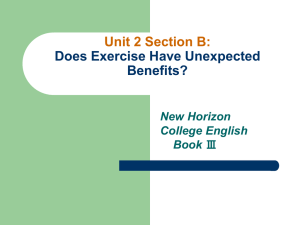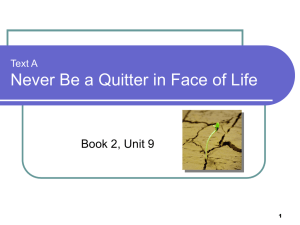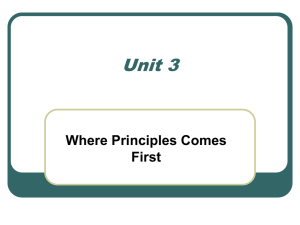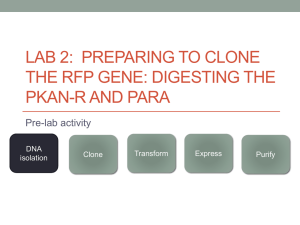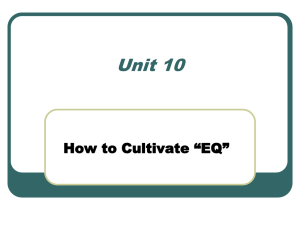Detailed Analysis
advertisement
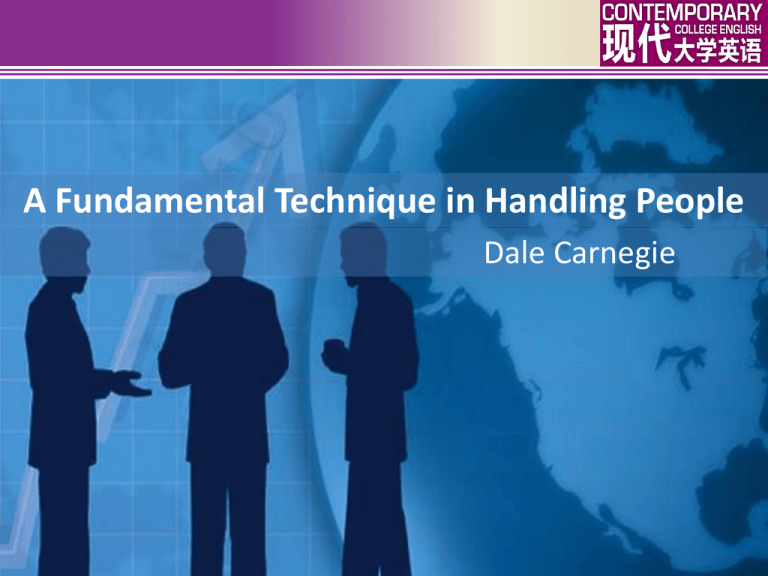
A Fundamental Technique in Handling People Dale Carnegie A Fundamental Technique in Handling People Unit 12 W arming up B ackground T ext Analysis R einforcement A Fundamental Technique in Handling People Unit 12 Questions / Activities Check-on Preview Objectives Warming up Warming up Questions / Activities •Have you ever read a book on self-improvement? If so, do you find it useful? •Do you think it necessary for people to have special training on skills for handling interpersonal relationships? Why or why not? •Do you follow certain principles of your own in handling interpersonal relationships? •What is the “fundamental technique in handling people” according to the author? Are you convinced? Warming up Check-on Preview • Match the words with their correct meaning in the text. 1. blunder 2. impair 3. procrastinate 4. indignation 5. opponent a. a feeling of anger and surprise caused by sth. that is unfair or unreasonable b. to make a stupid or careless mistake c. a person that you oppose in a game, contest, argument, etc. d. to damage sb. or make sth. worse e. a feeling of hatred for sb. that causes a desire to harm sb. f. to delay doing sth. you should do, usually because you do not want to do it Warming up Objectives Through this lesson, students will • be able to recap many examples and anecdotes used by the writer to illustrate what we should and shouldn’t do in handling people; • think about the question of criticism and human relations; • analyze the organization and the language style of the text; • learn the related vocabulary and other useful words and phrases in the text. A Fundamental Technique in Handling People The Author Background Genre Unit 12 Background The Author Dale Carnegie's main focus is on dealing with and motivating people successfully. His common sense approach is easy to understand and apply in both personal and business relationships. He developed several famous courses in selfimprovement, salesmanship, corporate training, public speaking and interpersonal skills. He wrote one of the most popular books in history, and taught millions of people how to achieve selfconfidence and interpersonal social skills. Dale Carnegie became an icon of 20th century America through his book and his classes. His simple, yet effective techniques for winning friends and influencing people have proven enduring and become part of the American culture. How to Win Friends & Influence People • In How to Win Friends and Influence People, Carnegie offers practical advice and techniques, in his exuberant and conversational style, for how to get out of a mental rut and make life more rewarding. His advice has stood the test of time and will teach you how to: make friends quickly and easily; increase your popularity; win people to your way of thinking; enable you to win new clients and customers; become a better speaker and a more entertaining conversationalist; and, arouse enthusiasm among your colleagues. This book will turn around your relationships and improve your dealings with all the people in your life. Over 15 million copies printed and sold since 1936 Background Central Idea • Dale Carnegie’s central idea is that if we want to learn how to handle people, we must always remember not to criticize them, not to speak ill of them, or ridicule them; not to indulge in fault-finding and gossiping about others’ mistakes or weaknesses, because if we do, it will always hurt people’s pride, create bad feelings, make them defensive, and destroy their confidence. • Therefore, the best way of handling people is to withhold our criticisms and show our understanding and trust. We should all be quick to recognize others’ virtues and be generous with our praise for their achievements. Background Genre Self-help books are books written with the stated intention to instruct any readers on a number of personal problems. They first appeared in the Victorian age and flourished to become a postmodern cultural phenomenon in the late twentieth century—a period marked out by “the burgeoning literature of self-improvement”. Background Writing Style Dale Carnegie is not a scholar. His reasoning is neither profound nor particularly strong in logic. But he expresses his ideas eloquently and uses many interesting historical anecdotes to illustrate his points, which makes his book interesting to read. A Fundamental Technique in Handling People Unit 12 Theme Text Analysis Structure Detailed Analysis Text Analysis Theme In handling people, we should be cautious in offering criticism, but be generous in showing understanding and giving praise. Text Analysis Structure Part I: Para. 1 • Criticism is usually futile and often dangerous in handling people Part II: Para. 2-21 • Let’s learn a few lessons in handling people. Part III: Para. 22-23 • Instead of criticizing, condemning and complaining, let’s try to understand people. Text Analysis • Structure of the Body The Body: Let’s learn a few lessons in handling people. (para. 2–21) – – – – As a young man, Abraham Lincoln leant to not to ridicule people the hard way. (para. 2–4) As president, Lincoln learnt to put himself in the position of the person he intended to criticize. (para. 5–11) People should not do to others what they do not want done to themselves. (para. 12–15) It takes character and self-control to be understanding and forgiving. (para. 16–21) Text Analysis Detailed Analysis Part I: Main Idea 1. Can you summarize the main idea in one sentence? 2. Animals learn better through encouragement than through punishment. Humans are the same. Do you agree? Do you think humans and animals are comparable in this respect? 3. Do you agree with the reasons that the author give for saying “criticism is futile?” Text Analysis Detailed Analysis put/force somebody on the defensive • if you put someone on the defensive in an argument, you attack them so that they are in a weaker position → go on the offensive : e.g. – an issue that put the White House on the defensive – 促使白宫进入防守状态的事件 – Warnings of an enemy attack forced the troops onto the defensive. – 敌军来袭的警报让部队进入防守状态。 • defensive adj. used or intended to protect sb. or sth. against attack – 我们使用核武器仅仅是为了防御。 – We use the nuclear weapons only for defensive purpose. – Do you think he will became a good defensive player? – 你认为他会成为一个好的防守球员吗? Text Analysis Detailed Analysis Part I: Words & Expressions Words apply; justify Phrases apply to; put someone on the defensive Words Phrases Sentence Pattern Grammar comparison Text Analysis Detailed Analysis Part II (para. 2-4): Main Idea 1. Why does the writer cite the example of Lincoln? 2. In what way is the writer familiar with Lincoln? 3. How do you like the writer’s account of the incident in Lincoln’s youth? Is it reliable? 4. Do you believe that this incident in Lincoln’s youth was the real reason for his generosity and tolerance? Text Analysis Detailed Analysis Part II(para. 2-4): Sentence paraphrase • • I have made as detailed and exhaustive a study …as it is possible for any being to make.(para.3) In this “as …as possible” pattern, if what follows the first “as” is a noun modified by an adjective, then the article “a” should be placed before the noun. C.f. – We should work hard to achieve as high a growth rate as possible. 我们应该努力实现尽可能高的增长率。 – Due regard must also be paid to "recruiting the staff on as wide a geographical basis as possible". – 征聘人员时还应充分注意“使他们来自尽可能广阔的地 域”。 Text Analysis Detailed Analysis Part II(para. 2-4): Sentence Paraphrase • He found out who wrote the letter, leaped on his horse, started after Lincoln and challenged him to fight a duel.(para.3) • Note the touch of humor here. The writer used four very short verb phrases in a row to create a sense of quickness and eagerness in the man’s getting into a duel fight, thus implying the extremeness of Lincoln’s provocation. Text Analysis Detailed Analysis indulge • 1. [ vi. & vt. ] to let yourself do or have something that you enjoy, especially something that is considered bad for you (indulge in…; indulge oneself) • Most of us were too busy to indulge in heavy lunchtime drinking. • 2. [ vt. ] to let someone have or do whatever they want, even if it is bad for them • His mother spoiled him, indulging his every whim. • • • • • • Some Indian people indulge in wedding extravaganza. 有些印度人沈迷于婚礼的大肆铺张。 I never indulge children with plenty of pocket money. 我从不放任子女花大量零用钱。 Will you indulge my curiosity and tell me how much it costs? 你能不能满足我的好奇心,告诉我那值多少钱? Text Analysis Detailed Analysis Part II (para. 5-11): Main Idea 1.Can you summarize the example given in this part? What point does it illustrate? 2.What purpose does para. 7 serve? Is this long story necessary? How does para. 8 make you feel? 3.How does para. 10 make you feel? If you were told beforehand that the letter was never mailed, would you have the same interest in reading it? 4.Why does the author tell us his guess of Lincoln’s reasoning behind the decision? Is his guess plausible? Text Analysis Detailed Analysis Part II (para. 5-11): Sentence Paraphrase …but Lincoln, “with malice toward none, with charity for all,” held his peace.(para. 5) • The quotation comes from Lincoln’s second inaugural speech in which he expressed the hope for a peace without hatred, and called upon his countrymen to act “with malice toward none, with charity for all… to bind up the nation’s wounds… to do all which may achieve a just and lasting peace among ourselves and with all nations.” Text Analysis Detailed Analysis Part II (para. 5-11): Sentence Paraphrase One of his favorite quotations was “Judge not, that ye be not judged.”(para.5) • This quotation comes from the Bible-Matthew71, which means: Do not judge others, for if you do, others will judge you by the same measure you use. Text Analysis Detailed Analysis Part II (para. 5-11): Sentence Paraphrase I do not believe you appreciate the magnitude of the misfortune involved in Lee’s escape.(para.9) Paraphrasing: I don’t think you fully understand what a big mistake you made in letting Lee escape or what serious consequences it will entail. Text Analysis Detailed Analysis Part II (para. 5-11): Sentence Study If I send this letter, it will only arouse hard feelings and impair all his further usefulness as a commander.(para.11) Paraphrasing: If this letter reaches him, it will only serve to hurt his confidence and make him feel inadequate as a commander, which will affect his performance in the future because he will never be his best again. Text Analysis Detailed Analysis close upon/ close in (on/upon sb./sth.) • to move nearer to sb./sth., especially in order to attack them: e.g. – – – – The lions closed in on their prey. 狮子包围了它们的猎物 看到一群暴徒包围了受害者,真令人毛骨悚然。 It was horrible to see the mob close in upon their victim. • close: to make the distance or difference between two things smaller – The other car was closing on us fast. Text Analysis Detailed Analysis Part II (para. 12-15): Main Idea 1. What was Mark Twain’s reaction towards criticism in para. 12? Is it appropriate? What does the writer want to illustrate by this example? 2. Is the author correct in saying the quotation in para.14 is from Confucius? Another saying, which is really by Confucius, would be more suitable here. What is it? 3. Do you agree with the author when he says humans are “creatures of emotion, creatures bristling with prejudices, and motivated by pride and vanity?” Text Analysis Detailed Analysis Part II(para. 12-15): Sentence Paraphrase He ordered: “Set the matter according to my copy hereafter and see that the proofreader retains his suggestions in the mush of his decayed brain.” Paraphrasing: From now on my articles should be printed without being proofread, I don’t need any advice from the proofreader who is too dim-witted to come up with any valuable idea. •“set” here means “arrange the letters in type for printing”. 排字 •Pay attention to the tone of the original sentence. Mark Twain is very angry and he deliberately uses formal language to ridicule and intimidate the proofreader. Text Analysis Detailed Analysis bristle [ vi. ] • 1. if an animal’s hair bristles, it stands up stiffly because the animal is afraid or angry • 2. to suddenly become very annoyed or offended at what sb. says or does: • bristle (with sth.) (at sth.) – John pushed back his chair, bristling with indignation. – His lies made her bristle with rage. – He bristled at her rudeness. • bristle with sth. phrasal verb • to have a lot of sth., or be full of sth. : – a battleship bristling with guns Text Analysis Detailed Analysis Part II (para. 16-21): Main Idea 1. What connotations do these following words have: “diplomatic”, “adroit at handling people”? Do you think the writer has made good choices of words in the Benjamin Franklin example? 2. “Any fool can criticize, condemn and complain— and most fools do.” What is the writer doing here? 3. If you were Hoover, would you have done the same in that situation? Text Analysis Detailed Analysis Part II(para. 16-21): Sentence Paraphrase • • • But it takes character and self-control to be understanding and forgiving.(para.18) Paraphrasing: But it requires our good moral qualities and the ability to control ourselves to be understanding and forgiving to others. character: a combination of qualities such as courage, loyalty, and honesty that are admired and regarded as valuable Text Analysis Detailed Analysis think/speak ill of sb. (formal) to think or say unpleasant things about someone • She really believes you should never speak ill of the dead. • 她着实认为你从不应该说死人的坏话。 • 我们不应该在背后说别人的坏话。 • We should not speak ill of others behind their backs. • 我还从来没有听过Paul说人家坏话。 • I’ve never heard Paul speak ill of a human being in my life. • ill (adverb) : (especially in compounds) badly or in an unpleasant way; (formal) not in an acceptable way – The animals had been grossly ill-treated. – They live in an area ill served by public transport. – ill-tempered, ill-informed, ill-mannered, ill-equipped, ill-prepared Text Analysis Detailed Analysis Part II: Words & Expressions Words indulge; ridicule; point-blank; impair Phrases boil with indignation; once too often; close upon; from a certain; standpoint; bristle with; adroit at; speak ill of Sentence Pattern I have made as … a study as it is …; What do you suppose Meade did…?; When dealing with people,…; … was made American Ambassador to France Grammar comparison; adverbs of frequency: never, ever Words Phrases A Fundamental Technique in Handling People Unit 12 Discussion Reinforcement Retelling Reinforcement Discussion Work in groups of four answer the following questions: • • • • In what sense is the writer using the word “criticism”? Is there any difference between “to criticize” and “to ridicule”? Is there any difference between “to praise” and “to flatter”? Can we do away with criticism altogether? If not, how can we best do with criticism? What are the best ways of motivating people from a psychological point of view? Reinforcement Discussion Carnegie’s book received vehement criticisms from high-minded scholars but won acclaims from the general public? Why is that?



